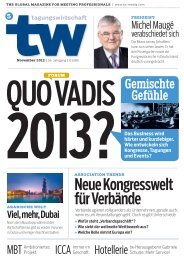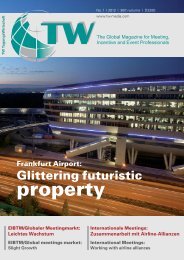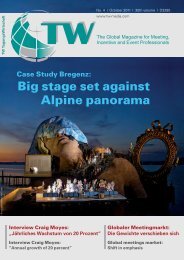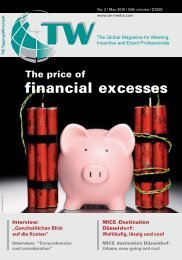Our industry celebrates diversity – but demands consistent quality.
Our industry celebrates diversity – but demands consistent quality.
Our industry celebrates diversity – but demands consistent quality.
Create successful ePaper yourself
Turn your PDF publications into a flip-book with our unique Google optimized e-Paper software.
The meetings <strong>industry</strong> successfully weathered the<br />
period in which the global economy teetered on the<br />
brink. Just a few big events were cancelled, and only<br />
very few associations had to contend with marginal<br />
declines in membership or with budget cuts.<br />
But of course meetings, incentives, congresses and<br />
events (MICE) are also directly dependent on global<br />
economic sustenance.<br />
We don’t need a safety<br />
net,” Michael Kirnberger,<br />
the then president of<br />
the VDR Business Travel Association<br />
of Germany, said<br />
back at the beginning of<br />
2009 <strong>–</strong> at a time when the<br />
economic world was trembling<br />
on the brink, banks<br />
were collapsing, people<br />
World Trade<br />
Heading for the<br />
next crash<br />
went in fear of losing their<br />
savings and financial execs<br />
were suddenly crying out for<br />
government support. Total<br />
global economic collapse<br />
was averted only by nationalising<br />
the debt of practically<br />
all big financial institutions.<br />
The costs of the bailout add<br />
up meanwhile to an astrono-<br />
mical 9,000 billion dollars <strong>–</strong><br />
and that is only the price for<br />
propping up western banks.<br />
Economic meltdown did not<br />
in fact occur, <strong>but</strong> the real<br />
economy is still faced with<br />
the threat of countless insolvencies<br />
and thousands of<br />
jobs are at stake. Economic<br />
output in many countries has<br />
contracted by five percent.<br />
Since the financial sector almost<br />
tipped over the edge,<br />
reporting now distinguishes<br />
between the real economy<br />
and the financial <strong>industry</strong>.<br />
Meeting planners have also<br />
seen their budgets shrink.<br />
2,740 meeting, incentive,<br />
congress and event (MICE)<br />
professionals were interviewed<br />
the world over for<br />
the FutureWatch 2009<br />
study. The tenor of the findings<br />
was clear: for the first<br />
time in many years the biggest<br />
survey of its kind forecast<br />
not only a drop in the<br />
number of meetings (by nine<br />
percent), <strong>but</strong> also shrinking<br />
budgets (down by six percent).<br />
“Individual corporate<br />
events are being cancelled,<br />
budgets cut,” Jacquie Rogers,<br />
general manager of the<br />
Convention Centre Liverpool,<br />
stated last year. “We<br />
are registering around 30<br />
percent fewer bookings by<br />
corporate clients,” Greg<br />
O’Dell, CEO of the Washington<br />
Convention Center, similarly<br />
summarised for 2009.<br />
However, association business<br />
continues to have a stabilising<br />
effect in the meetings<br />
<strong>industry</strong>, as international<br />
association meetings have<br />
a very long planning horizon<br />
and are almost never called<br />
off. At the same time the<br />
public authorities rolled out<br />
monumental economic stimulus<br />
packages, so that companies<br />
are now ramping up<br />
their earnings again, share<br />
indices are climbing and dividend<br />
streams flowing once<br />
more<br />
At first sight the economy<br />
appears to be bouncing back<br />
surprisingly quickly from the<br />
mega crisis at the end of the<br />
last decade. At least, that’s<br />
what the stock markets suggest.<br />
The major share indices<br />
<strong>–</strong> Dow Jones, Nikkei and<br />
Dax <strong>–</strong> have soared since mid-<br />
March by 50 to 60 percent<br />
each. And the prices of crude<br />
The costs<br />
of the bailout<br />
oil, copper and other raw materials<br />
have likewise more<br />
than doubled. However, this<br />
monumental increase is not<br />
underpinned by any corresponding<br />
economic development.<br />
“Prices are rising because all<br />
this money has to go somewhere,<br />
not because shares<br />
as such are attractively<br />
priced,” the German business<br />
magazine Wirtschaftswoche<br />
writes in an analysis<br />
of the current stock market<br />
boom. The magazine reports<br />
that the price-earnings ratio,<br />
a valuation ratio of a company’s<br />
current share price compared<br />
to its per-share earnings<br />
over the previous<br />
twelve months, has hit a historic<br />
high of 133. As from 14,<br />
shares are considered overpriced.<br />
The 500 biggest exchange-listed<br />
US companies<br />
are thus trading at almost ten<br />
times their real value.<br />
This price surge stems solely<br />
from the massive amounts<br />
of liquidity that governments<br />
and central banks have<br />
pumped into the economy.<br />
Banks are able to borrow unlimited<br />
sums of money from<br />
1/2010 107<br />
MIXED PICKLES









